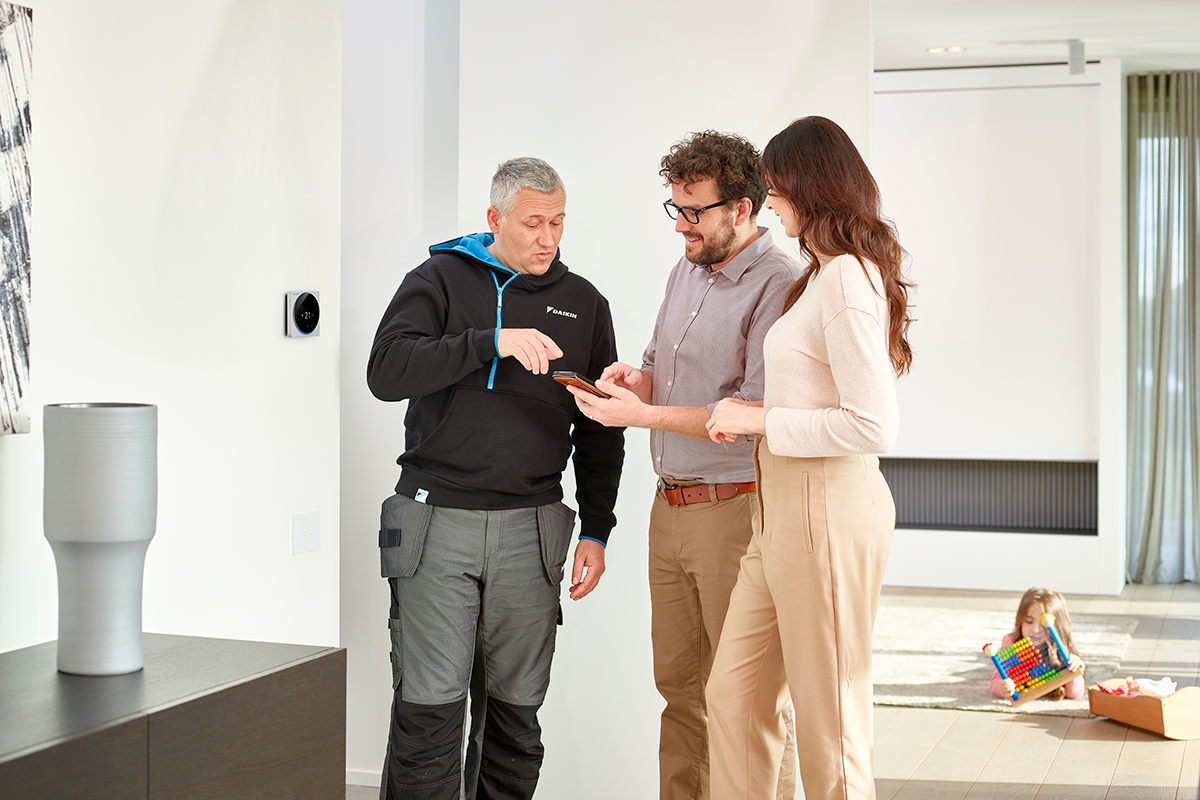Ask the expert: why heat pumps go wrong
We ask Rob Stiby, our resident heat pump guru, to explain why heat pumps go wrong, how to avoid breakdowns, and how to find the best installer for the job.

How reliable are heat pumps?
Working within the product quality department, I see actual claim ratios of failed Daikin products. It’s no wonder we’re all proud to work for Daikin, considering how reliable our equipment is. Almost all failures are due to poor installation and lack of service. Daikin heat pumps are very reliable and shouldn’t go wrong at all.


Heat pump sizing is crucial for the performance of the system
If your heat pump is the wrong size for your home, it won’t provide the levels of efficiency you’re looking for. The size of the system is dependent on the size of your house and the quantity of insulation – a two-bed flat with good insulation will need much less heat input than a four-bed house with poor insulation.
If it’s too large..
…you could find it works, but short cycles a lot. You may notice it switching on and off regularly as it quickly heats the space. A heat pump is meant to keep operating to match the temperature set by your thermostat. But if it cycles too often, this will heavily reduce the performance of your heat pump. Be aware that some cycling is inevitable in Spring and Autumn.
If it’s too small..
…it just won’t be up to the job. An undersized system will often run continuously in an effort to meet the required temperature. This increases electricity consumption, causes wear and tear and creates further problems that need fixing. On cold days, a house heated by an inadequate heat pump will struggle to keep the temperatures comfortable.
A poorly installed heat pump can cause many issues
A heat pump needs to be installed correctly to give efficient and reliable performance. The most common issue we see is a lack of water flow. This is either due to debris within the central heating system or incorrectly sized pipe distribution.
System cleaning
With a new or old installation, it’s vitally important to clean the system before a heat pump is added. A good installer will make sure this happens. Most of our engineers never see a failed system with clean water.
Home assessment
A professional installer will assess your home and work out what size heat pump you need. They’ll specify if your system is suitable or provide designs for a suitable system for your home, eliminating any problems with the heat pump not being large enough to heat the space. They’ll work out the required heat emitter (radiator, underfloor etc) for the space and provide a warranty to keep it running smoothly.
Commissioning
Commissioning is a vital process and will ensure your system is set up and working correctly. It is vitally important that the designed information is available for a third-party commissioning engineer/installer if the designer is independent. This will mean your system can be set up as it was designed, and minor tweaks can be carried out on services if you request this*.
And remember, YOU need to understand the controls
We see a lot of customers who do not understand the controls. Personally, I like a simple system, with no thermostatic radiator valves (TRVs) and not even a room thermostat. We just run it on something called weather compensation. This will increase and decrease the water temperature in your heating system depending on the outdoor air temperature, meaning we can match the heat loss of the building.

How often should you service your heat pump?
It needs a professional service every year, just like a gas boiler. You can also take a few steps yourself to make sure it’s running smoothly. Take a few moments to inspect it for damage and leaks. It’s also good practice to check the airflow isn’t blocked around the outdoor unit e.g. remove leaves and ensure the drain is clear. We also recommend giving it a test run before the winter months kick in.
How do you choose the right installer?
You want to choose an installer with the right qualifications and training. First, check that they have MCS qualifications or equivalent. This will ensure they meet the requirement for correctly sizing the equipment and prove the heat emitters will work correctly. And, if you’re having a split heat pump being installed, they will also need to have F gas qualifications.
Finding an installer is easy with the Daikin-trained Sustainable Home Specialists network.
*To prevent any confusion if Daikin is requested to commission the system, the system is referred to as the Daikin equipment and not the heat emitters. If heat emitters have been installed these will also need to be commissioned, Daikin does not offer this service at present. The importance of commissioning the heat emitters is to ensure the system is balanced.

